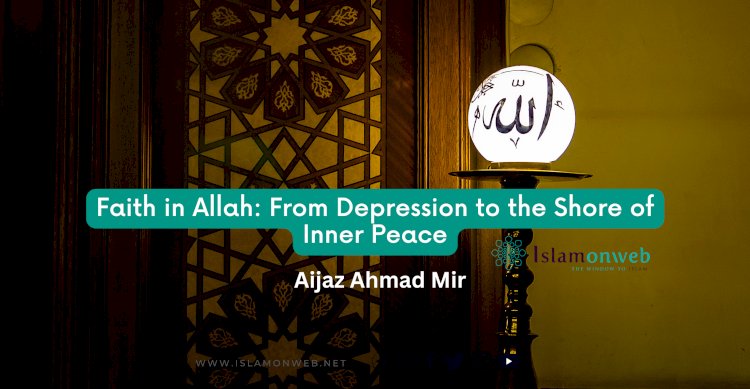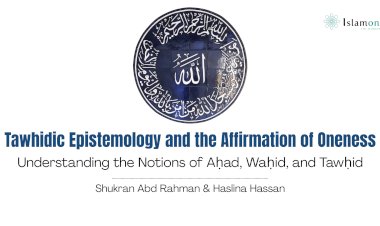Faith in Allah: From Depression to the Shore of Inner Peace
Modernism claims that material possessions and worldly achievements are the keys to happiness and the cure to all miseries. However, as believers, we know that true happiness and contentment can only be found in God, the ultimate source of all blessings and the cure for all our sorrows. God created both matter and spirit and while we are free to use the resources of this world for our benefit, we should never become slaves to materialism and put our trust solely in the things of this world. Many people today pursue wealth and fame to find happiness, but despite their achievements, they often feel empty and unfulfilled inside. True happiness cannot be found in material possessions but in a spiritual connection with God. This is why several millionaires give donations and charity to find meaning and happiness in life.
Studies have shown that people who prioritise their spiritual needs and maintain a strong connection with God are less likely to suffer from depression and anxiety.[i] This is because their faith gives them a sense of purpose and meaning in life and helps them navigate this world's challenges and trials. In contrast, those who place their trust solely in material possessions and deny the existence of God are more likely to suffer from depression and anxiety. This is because they lack a sense of purpose and meaning in life and are constantly searching for something that can only be found in a spiritual connection with God. As believers, we must strive to balance our material and spiritual needs, using the world's resources for our benefit while always keeping our trust in God and seeking His guidance and blessings in all we do.
Shaikh Yusuf Al Qardawi, in his book “The Impact of Iman in the Life of an Individual” quotes an article titled "The People of Paradise are Not Happy," shedding light on the people who live in Scandinavian countries and have all the worldly riches. The author notes that in Scandinavian countries, where material wealth and security are abundant, people still resort to suicide as a means of escaping from their internal struggles. In Japan, too, the pandemic has caused people to lose their jobs, leading to increased suicides. To deal with this problem, the government appointed a special minister. Even in America, where fame and fortune are idolised, many actors and actresses have succumbed to depression and taken their own lives[ii].
In his book titled "The American Paradox: Spiritual Hunger in an Age of Plenty," David Myers emphasised that social issues and a lack of fulfilment plague prosperous nations in the twenty-first century. This is a result of their intense concentration on financial gain and strong individualism. He offers the American people several pieces of advice, one of which is to reconnect to the spiritual and moral traditions of their society. This will assist them in acquiring a sense of purpose and meaning in life, which is often absent in rich nations such as the United States.[iii]The material possessions and worldly success that many of us covet cannot provide a lasting cure for the mental afflictions that afflict mankind. In this realisation, we must turn to our faith and seek solace in the love and guidance of our Creator, for He alone can provide us with the peace and contentment that our souls crave.
When someone loses their job, fame, or a loved one, they may feel like their world is falling apart. While there are scientific reasons why someone might turn to suicide during these times, spiritual and knowledge-related factors are also at play. From childhood, many people are taught that wealth, fame, and honour are the keys to success. So, when someone fails to attain these things, they may feel like their life has lost all meaning. They might start to believe that suicide is the only way out.
The belief in Allah is a powerful force that can bring contentment and peace to believers in all situations, whether rich or poor. This trust in Allah should be instilled in children from a young age, and they must be taught the concept of 'Tawḥīd', which emphasises that only Allah is worthy of worship. This faith isn't just about worshipping Allah; it also means being happy with what He has planned for us and never giving up on His mercy.
Through the stories of Prophets and their companions, people are reminded of the hardships and tragedies they faced and how they persevered through them with patience and faith in Allah in traditional Muslim societies. The Quran explicitly emphasises the importance of patience and perseverance in difficult times, promising great rewards for those who do so. This tradition of instilling trust in Allah and contentment in children led to a society of believers who were so content that even kings would leave their kingdoms for the peace they enjoyed. However, this tradition is being ignored in today's modern Muslim societies, and it needs to be revived. The power of this belief cannot be underestimated, as it allows believers to face any challenge with grace and confidence, knowing that Allah is with them every step of the way. A 12th-century Islamic spiritual master, Al Ghazali, said, "Desire makes slaves out of kings, while patience makes kings out of slaves.” Patience comes through spirituality, and desires are primarily about material possessions, fame, and recognition. Barry Schwartz in his book “The Paradox of Choice: Why More Is Less” argues that the abundance of choices leads to anxiety, indecisiveness and dissatisfaction[iv].
Depression is a real and debilitating condition that can affect anyone, regardless of religion and race. However, as a believer, one can take proactive steps to ward off depression by improving their faith in Allah. This is not to say that depression is caused by insufficient faith in Allah, but rather that strengthening one's faith can effectively combat depression. Numerous examples of believers who have overcome depression through their faith in Allah. Studies have shown that depression and gratitude are opposite feelings, thus the more you practice gratitude, the less you experience depression [v]. Cultivating a grateful mind and heart can effectively ward off depression, as Allah promises to increase those who are grateful. Prophet Muhammedﷺ taught us the best method for cultivating gratitude, which is to compare ourselves to those who have less than us. The Hadith mentions, "Look at those who are lower than you but do not look at those who are higher than you, lest you belittle the favours Allah conferred upon you”[vi]. By doing so, we avoid the trap of being ungrateful and falling into mental disorders like depression and anxiety. Theodore Roosevelt said, "Comparison is the thief of joy", and this was the thing which modern psychologists later discovered. Therefore, as a believer, it is important to strengthen our faith and cultivate gratitude in our everyday lives. Depression is a serious and natural illness, but we can avoid it and get over it by improving our faith in Allah.
Cognitive Behavioural Therapy has been widely recognised as an effective treatment for depression, but have you ever considered the power of Islamic teachings in combating negative thoughts and beliefs? Islam offers a unique approach to tackling depression, anxiety, and other psychiatric disorders by guiding its motivational verses in the Quran and Hadith. In CBT, individuals are taught to change their negative thoughts to positive ones. Similarly, Islam teaches us to counter our negative thoughts by seeking solace in the verses of the Quran and Hadith. These verses offer a beautiful and optimistic approach to life and provide the necessary tools to cope with difficult situations.
In the past, when there were no selective Serotonin Inhibitors or other modern medications for depression, people relied on cultural and religious beliefs to treat themselves. Muslims in the past used to cure their depression by reading motivational verses and improving their belief systems through actions. Today, we can still learn from these practices and use them to combat our negative thoughts and beliefs. Studies have shown that being altruistic and helpful to others can reduce our emotional distress. Additionally, Islam teaches us to smile when meeting our brothers, which can positively impact our brain chemistry and help us release beneficial chemicals. There are countless instances in Islamic literature where we can find guidance on coping with difficulties and improving our mental health. By embracing these teachings and incorporating them into our daily lives, we can actively combat depression and other mental health issues.
Are you feeling overwhelmed, stressed, or anxious? Do you want to improve your mental health and spirituality? Look no further because the solution is simpler than you think. Just like we take care of our physical bodies, it is crucial to take care of our souls as well. In today's fast-paced world, where stress levels are at an all-time high, we must prioritise the health of our souls. By following the principles of Islam, we can strengthen our souls and lead a more peaceful and fulfilling life. Reciting Quran with meaning and praying five times Salah are powerful tools to connect with Allah and gain inner peace. Practising patience, gratitude, and helping others are proven ways to uplift our souls.
Furthermore, being self-compassionate and less judgmental towards ourselves and others can do wonders for our mental well-being. And let's not forget the benefits of meditation. Just ten to fifteen minutes of daily
Note: This article does not discourage using medicines for mental disorders. However, this article argues that one can improve their mental and spiritual health by increasing their beliefs in conformity with Islam.
Endnotes:
[i] Roberts, Nicole F. 2019. “Science Says: Religion Is Good For Your Health.” Forbes. March 29, 2019. https://www.forbes.com/sites/nicolefisher/2019/03/29/science-says-religion-is-good-for-your-health/?sh=4a22b2473a12.
[ii] “Actors and Celebrities Who Committed Suicide - IMDb.” 2023. IMDb. March 3, 2023. https://www.imdb.com/list/ls097007717/.
[iii] MYERS, D. G. (2000). The American Paradox: Spiritual Hunger in an Age of Plenty. Yale University Press. http://www.jstor.org/stable/j.ctt1nq9zq
[iv] “The Paradox of Choice - The Decision Lab.” n.d. The Decision Lab. https://thedecisionlab.com/reference-guide/economics/the-paradox-of-choice.
[v] and gratitude are opposite feelings; thus, the more you practice gratitude, the less you experience depression.
[vi] Bulugh al-maram: bk. 16, hadith 1482.
About the author: Aijaz Ahmad Mir writes Islamic content and is pursuing his Ph.D. in Political Science from Maulana Azad National Urdu University, Hyderabad, Telangana.
Disclaimer
The views expressed in this article are the author’s own and do not necessarily mirror Islamonweb’s editorial stance.

























Leave A Comment